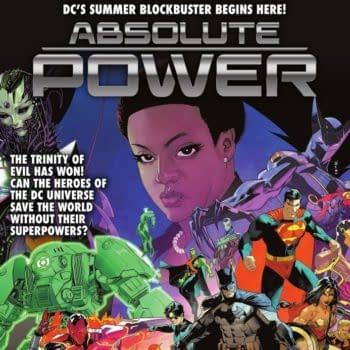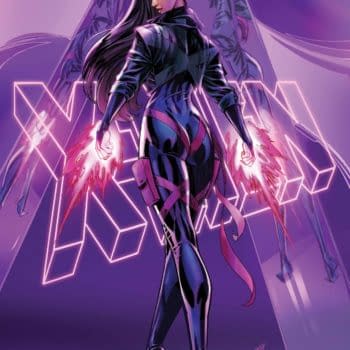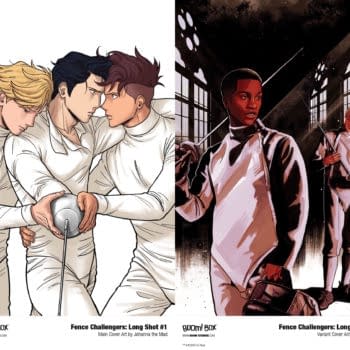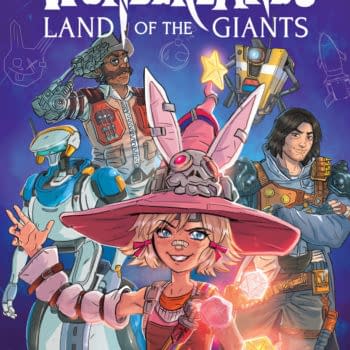Posted in: Comics, san diego comic con | Tagged: Comics, entertainment, Intellectual Property Law, Michael Lovitz, mickey mouse, sdcc, superman
Comic Books And The Law – Talking With Michael Lovitz About IP's And SDCC

BLEEDING COOL: How did you end up specializing in intellectual property law?
MICHAEL LOVITZ: It's really interesting – not a road one would expect. In high school, I often dreamed of working for NASA, and thought aerospace engineering might be the best way to get there. So as an undergrad in college I majored in Astrophysics (unfortunately my university didn't have an aerospace engineering program) and English. But by my junior year, I found I was less interested in designing circuits and space vehicles and more interested in logic and writing, and so decided to pursue a career in law. Although I never expected to use my degree in astrophysics again, I soon learned about patent law, where a science degree is required, and during my first summer of law school went to work for a patent firm, where I ended up starting my intellectual property law career.
BC: Who are some of your clients that you can mention and what types of cases have you had to deal with?
ML: In my 26 years of practice, I've been honored to work for many great comic book creators whose work I respect, including Dan Slott, Bob Layton, Mark Waid, Jim Valentino, Colleen Doran, Bill Sienkiewicz, Jerry Ordway, Keith Giffen, Nick Cardy, Alex Horley, Tony Isabella, Danny Miki, Charlie Adlard, and many others creators at varying stages in their careers. I've also been fortunate that my best referrals come through word of mouth, whether from other clients or from parties or attorneys who have been on the other side of transactions. Someone who I recently signed as a client, Jae Lee, came to me as the result of such a referral.
The types of cases vary – it could for as little as helping with an application for registration, or as much as full litigation over infringement of rights in a property. However, the majority of issues involving selection of titles and trademarks, registration and enforcement of trademarks and copyrights, both in the US and abroad; negotiating talent agreements; reviewing, drafting and negotiating licenses and agreements for publishing (print and digital), movies and television. I've had opportunities to work with television production companies, and to assist major and mini-major studios on television and movie matters – two examples are NBC/Universal and Summit Entertainment (now part of Lions Gate).
BC: You are doing three panels/classes at SDCC this year and they're basically tied together. What can you tell us about Comic Book Law School 101: Woulda, Coulda, Shoulda…
ML: Thanks for mentioning the panels. I've been presenting "Comic Book Law School" panels for 22 years in San Diego. It was a natural outgrowth from my years of volunteering with Volunteer Lawyers for the Arts programs, starting back when I was based in Philadelphia, where I would volunteer time to provide free or low-cost legal assistance to members of the arts community. I started the "Comic Book Law School" programs to help give back to the comics industry by providing useful legal information to creators who attend, free to anyone at the convention; I also make myself available for questions after each session to provide additional help.
As to the seminars themselves, on Thursday morning we start with the basics – understanding the building blocks of intellectual property rights. The class will cover what those rights are, how they're acquired, how the registration process works for copyrights and for trademarks (and the benefits of each), and ways for protecting yourself when working with others, be they publishers or collaborators.
BC: Then on Friday you are doing Comic Book Law School 202: Selling the Sizzle. Can folks who missed 101 still get in? What is the focus of the second class?
ML: Good question! First of all, everyone is welcome each day – and prior attendance is not required. Although attending Thursday's class provides a total "start to finish" picture, folks can still jump in on day 2 (or 3) without missing a beat.
Friday's session is focused on agreements – mostly licenses and assignments – papering the deals that bring you money from your creations. We'll touch on publishing agreements and digital distribution, movie options and deals, merchandising licenses, video games, and also collaboration agreements and entity formations (corporations, LLCs) – anything involved in the process of generating money with your commercial capital.
BC: And now we move on to Saturday and Comic Book Law School 303: And Another Thing… What does this cover and will it wrap up everything folks will need to know to navigate the comic industry? Is there a diploma offered at the end?
ML: No diploma, but I'll gladly provide a hearty handshake and rousing "Job well done!" But thanks for the idea, which I'll keep in mind for next year's classes. ;-)
Saturday is the day we cover several of the more advanced issues facing creators, such as internet and social media concerns, enforcement of rights (in the US and abroad), an overview of litigation (whether you're bringing one or defending one, and whether in federal court or before the Trademark Trial and Appeal Board), and a discussion of fair use vs. parody vs. satire. It's important for any creative community, like the comics community, to understand how to protect themselves and produce new and creative products without taking unfair advantage of the rights of others.
BC: How much of what a creator needs to do legally can they do on their own? And at what point does it make sense to call in an attorney to help?
ML: It really depends on the creator and their own comfort levels. For instance, I routinely advise clients to file their own copyright applications – it can be done on-line, is relatively inexpensive, and the Copyright Office is really great about answering questions. Plus, copyright registrations are relatively easy to correct if there's an error in the application. But trademark applications are not as forgiving, so although creators can file directly without using an attorney, I normally recommend they use (or at least consult with) an attorney to avoid making costly mistakes or unnecessary limiting their rights. But the one area where I believe creators should always involve an attorney is in their agreements. I've seen creators try to cobble together documents using examples they've found on the Internet, and the results can range from a messy contract with key points missing and filled with undefined terms (which is far more important than many people realize) all the way up to complete disasters. For example, there are times when a creator thought the language in a contract gave them a role in making key decisions, only to find out the terms as written didn't have the meaning they'd thought it had, and instead marginalized their input both creatively and financially. This kind of thing can impact a creator both financially and emotionally, demoralizing a creator who now feels betrayed or foolish (or both). I've also had clients come to me after they've gotten into conflicts because they signed poor agreements (whether poorly drafted, or just bad for the creator) and now discover that they've either given away rights they didn't mean to, will be getting no money, or else have no way to break free from obligations they'd not realized were in the document.
BC: What is the number one thing that creators either fail to do or don't realize and it ends up causing legal problems later on?
ML: Getting things in writing, especially when it comes to working with family, friends or past collaborators. Many creators don't bother or they feel they can't afford to have an attorney draw up an agreement, but the reality is these things become much more expensive to untangle later on. In fact, there's an entire program I do with a couple of other attorneys that we nickname "the high cost of doing nothing" which has topics that include failing to prepare written agreements, to form companies, to protect titles or brand names, etc., all because they decided not to spend money on a lawyer at precisely the time when consulting with a lawyer is most vital.
BC: And I would be remiss if I didn't ask you two questions specific to legal things happening in the industry of late. First, with the different lawsuits that have come up over the years with veteran creators trying to get the rights back to character the created under shaky work-for-hire contracts of the pre-80's… generally speaking, what are the odds of Marvel or DC ending up losing some of the characters that are so closely associated with them? Do you think it's a matter of time before someone wins one of those cases or is the publisher's position too strong?
ML: Well, first of all, reversion of rights under pre-80's contracts has already happened. Remember, the Siegel litigation wasn't about whether or not the Siegel's were entitled to a reversion of copyright rights; in the end the issue that was litigated came down the extent of the reversion and whether or not there was a settlement agreement between DC and the Siegel family prior to the start of the litigation.
But more generally speaking – by which I mean speaking purely academically (and which should not in any way be taken as to referring to any actual creator or publisher) – your question requires looking at two separate, but related, sections of the copyright act. The first deals with pre-1978 works, which are governed by the 1909 Copyright Act, which statute didn't contain any reference to the concept we've come to know as "work made for hire". In reading through the briefs filed with the Supreme Court in the Kirby case, which provided details on the origins of the "work made for hire" doctrine that came into being in the 1960s, I can see a very strong argument to challenge the applicability of that doctrine to works created by comic veterans working in the Golden Age – after all, how can someone be said to have transferred rights under "work made for hire" when that concept hadn't yet been created. It would be like saying Mozart agreed to transfer the right to sell his works on 8-track tapes.
The second termination section deals with works created on or after January 1, 1978, governed by the 1976 Copyright Act, which does define "work made for hire". In the case of these works, the biggest question is whether or not the works created by those veteran creators qualified under the Statute's definition of "works made for hire", either because the creator was an employee or because as an independent contractor the work created falls within the nine (9) categories identified in the statute. Here I can see valid arguments that go both ways. However, both Marvel and DC have gone to great lengths to stay ahead of this issue and to resolve many potential conflicts in ways that are intended to provide creators with additional compensation.
So at this stage, I think you're more likely to see these types of lawsuits in other industries first – the music industry in particular is primed on this topic.
BC: And secondly, as the years go by do you expect to see characters like Mickey Mouse and Superman eventually fall into the public domain or do you think the corporations behind them are powerful enough to keep getting the rules changed to their benefit?
ML: This is actually a far more complex question than you might think, involving the interplay of different areas of intellectual property law which could provide means other than copyright for protecting creations beyond those provided under the copyright statute. However, rather than going into a full explanation that's likely to put at least some of your readers to sleep, let me give you the "50,000 foot view" answer.
Our founding fathers included language in the Constitution forming the basis for the US patent and copyright laws. Specifically, among the Congressional powers listed were promoting the progress of science and useful arts by securing "for limited times" to authors and inventors the exclusive rights in their writings and discoveries. So on the one hand, I'd like to believe Congress will acknowledge this original intent and finally cap the term of protection as it currently stands.
However, the cynic in me sees a situation under which corporations will obtain further extension(s) of the term of protection. Most likely to happen is that, with sufficient lobbying pressure applied, Congress will yield and grant another extension of protection for 20 years (or more). Another possibility, given court rulings in the past few years (including the Supreme Court's Hobby Lobby ruling last year) could be an effort to have corporations given the same rights as individual authors when it comes to calculating the term of protection; if a corporation is viewed as "persons" for the purposes of the copyright statute, the length of protection (which is for "life of the author plus 70 years") could give corporations a near infinite duration of protection as long as they continue to remain in business.














